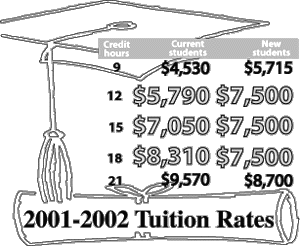|
Aid
not impacted by tuition plan Editor’s Note: This is the first in a series of stories examining the impact comprehensive tuition will have on the university. By Carrie Woodall The flat-rate tuition will have only a minor impact on financial aid and scholarships, Director of Financial Aid and Student Scholarships Mike Scott said Monday. “We were
already using 30 hours as an average cost (a year),” he said.
“So when we determine (a student’s) financial aid eligibility,
even in the past, we used 30 hours as a starting point to determine
cost.” Scott said the 30-hour base for financial aid was determined a long time ago because the government only requires an average cost that is most beneficial to students. The university chose 15 hours a semester, but that number can be adjusted if the student takes more hours. Scott said students are wasting their financial aid money by only taking 12 hours and not taking at least the 15-hour base. “A student taking 24 hours (opposed to 30 hours) is sort of getting a little more financial aid than theoretically they’re eligible for,” he said. “But in the end, that student ends up paying more total by only taking 12 hours, even though they’re getting a little bit better on the financial aid.” Scott said they pay more because the family is still paying the net cost of the education, and they are really just prolonging their time at TCU if they take only 12 hours. Chancellor Michael Ferrari said the cost of education is so high for private institutions that most students have a significant amount of debt after they graduate, and graduating in four years would help that cost. “The greatest push is to get students to graduate so they can get on to graduate school or out into the work force,” he said. “Many of our students not only have to work while they’re here, but they also have to take out loans.” Scott said the cost of prolonging a student’s education by a year is huge. Factoring in tuition, other fees and housing while not getting paid in the work force becomes a large amount of money. Although there is no major impact on aid from the flat rate, there will be a small adjustment in scholarships that are tuition-based, such as the Chancellor’s Scholarship, increasing from a maximum of $12,480 to $15,000 a year. Scott said the flat-rate tuition makes the work of the financial aid office simpler because there will not be a need to adjust scholarships according to tuition increases. Scott said new students will receive more money in scholarships with the comprehensive tuition policy, but they will actually pay more than current students on a 30-hour base next fall. He said the Office of Scholarship and Financial Aid is examining how to account for the shift in tuition costs in the budget. “The comparison of the increase in cost of 15 hours for this year to what a new freshman will pay for 15 hours next year, is what we are trying to compensate for in the budget (for financial aid),” he said. He said tuition is different for incoming and current students because there was a strong desire to not affect the current students any more than was necessary. For incoming freshmen, the cost of tuition for 15 hours has increased by 14.6 percent, but the tuition for current students has increased 7.7 percent from this year. Carrie
Woodall
|
The TCU Daily Skiff
© 1998, 1999, 2000, 2001
Web Editor: Ben Smithson
Contact Us!

